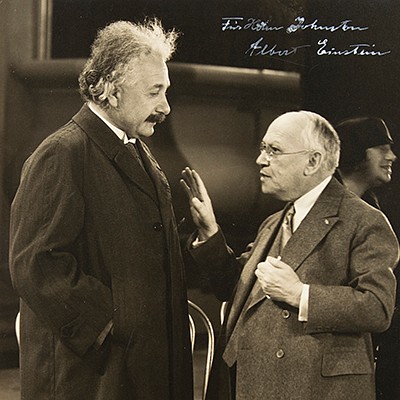Georg Cantor Autograph Letter Signed
Two ways to bid:
- Leave a max absentee bid and the platform will bid on your behalf up to your maximum bid during the live auction.
- Bid live during the auction and your bids will be submitted real-time to the auctioneer.
Bid Increments
| Price | Bid Increment |
|---|---|
| $0 | $5 |
| $50 | $10 |
| $200 | $25 |
| $500 | $50 |
About Auction
Sep 14, 2022
RR Auction support@rrauction.com
- Lot Description
German mathematician (1845-1918) who created set theory, which has become a fundamental theory in mathematics. Cantor established the importance of one-to-one correspondence between the members of two sets, defined infinite and well-ordered sets, and proved that the real numbers are more numerous than the natural numbers. ALS in German, one page both sides, 4.25 x 7.25, April 14, 1894. Handwritten letter to important French mathematician Charles-Ange Laisant, promoting his idea of an International Congress of Mathematicians. In part (translated): "It is with great pleasure that I have read your letter, and I am glad that the idea of the International Congress of Mathematicians is sure to be actively backed by you. I hope to have, in a not too remote future, the honour to salute you in person. In the spring 1884, the first time (and up to now, unfortunately, the only one) I went to Paris for 8 days, I met with only fourth colleagues mathematicians at their place: Mr. Charles Hermite, whom I had already met at C. F. Gauss centenary celebrations in 1877, and Messrs. Appell, Picard and Poincaré, whom I met for the first time on that occasion. Speaking of scientific correspondence, I was also in contact with Mr. Valson in Lyon, Mr. Barthélémy St. Hilaire, Mr. Jules Simon, Mr. Charles de Freycinet and the late Mr. Adolphe Franck, who passed away one year ago. Perhaps you will find the opportunity to friendly remind one or several of them of me, and ask them, on my behalf, if they would be kind enough to back our idea of an International Congress of Mathematicians." A French translation has been penned on the adjoining sheet in the hand of mathematician Émile Lemoine, a common friend of Cantor and Laisant. In fine condition.
Cantor played a prominent role in establishing the International Congress of Mathematicians (ICM). He is credited along with Felix Klein with putting forward the idea of such a congress in the 1890s. This letter, which seems to have remained unknown to Cantor’s biographers, is a stunning testimony to his efforts and sheds a very precious light on the early history of the ICM, three years before the Zurich congress in 1897.
In his biography of Cantor, Joseph W. Dauben writes: 'The earliest reference I have found to Cantor’s efforts in promoting the idea of an international congress is a letter to Vassilief dated July 4, 1894.' He then goes on: 'See also letters to Laisant of April 25, 1895 [and] September 22, 1895.' The references he gives for these letters are Cantor’s letter-book, now part of the collection of the Akademie der Wissenschaften. The present letter seems to have remained completely unknown until today. - Shipping Info
-
Bidder is liable for shipping and handling and providing accurate information as to shipping or delivery locations and arranging for such. RR Auction is unable to combine purchases from other auctions or affiliates into one package for shipping purposes. Lots won will be shipped in a commercially reasonable time after payment in good funds for the merchandise and the shipping fees are received or credit extended, except when third-party shipment occurs. Bidder agrees that service and handling charges related to shipping items which are not pre-paid may be charged to a credit card on file with RR Auction. Successful international Bidders shall provide written shipping instructions, including specified Customs declarations, to RR Auction for any lots to be delivered outside of the United States. NOTE: Declaration value shall be the item’(s) hammer price and RR Auction shall use the correct harmonized code for the lot. Domestic Bidders on lots designated for third-party shipment must designate the common carrier, accept risk of loss, and prepay shipping costs.
-
- Buyer's Premium



 EUR
EUR CAD
CAD AUD
AUD GBP
GBP MXN
MXN HKD
HKD CNY
CNY MYR
MYR SEK
SEK SGD
SGD CHF
CHF THB
THB












